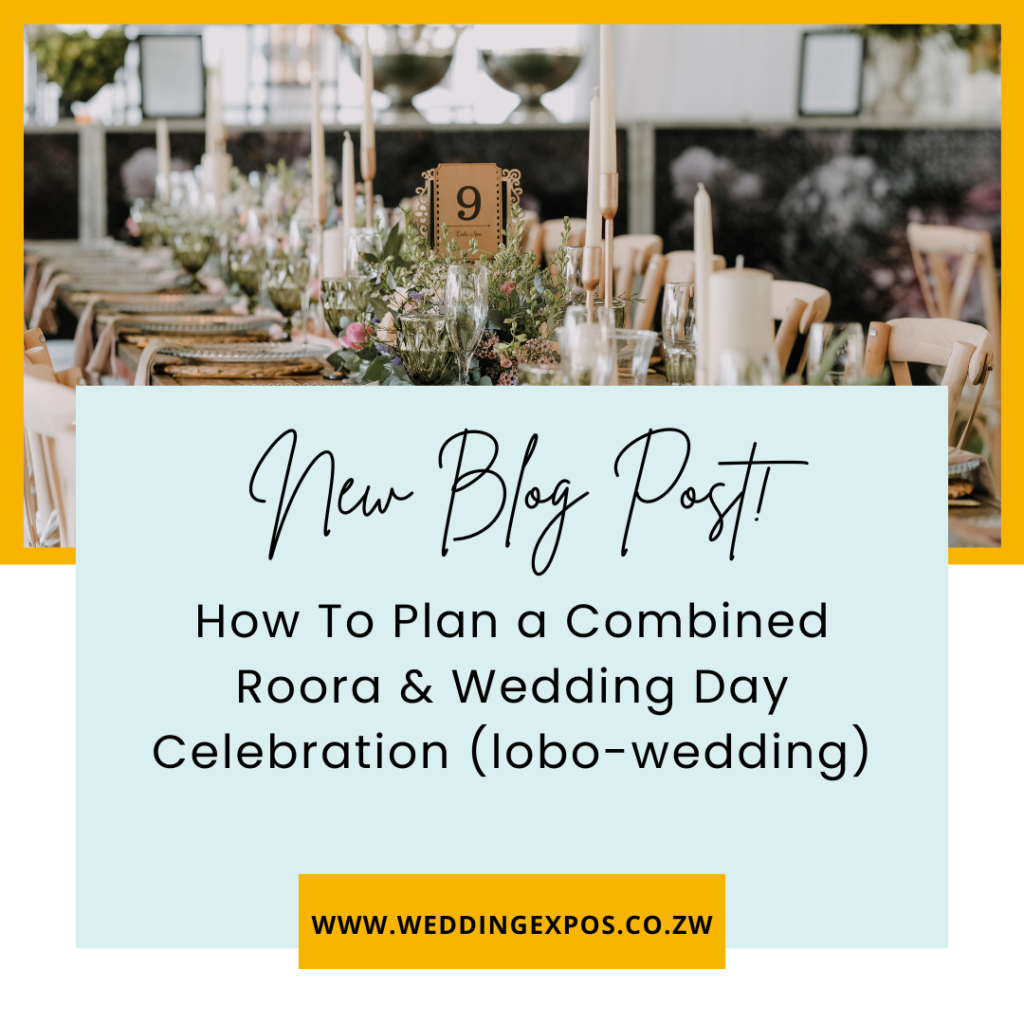
A lot of couples have been wondering about how to plan a combined roora and wedding day.
Some call this type of event a lobowedding, which is the short form version of the phrase lobola wedding day. Whilst, some call it a mini wedding celebration.
In this article, I give you some tips on how to effectively hold your roora and wedding day celebrations on one day. But first, I would like to point out some advantages and disadvantages of the lobowedding.
Advantages of holding a roora and wedding on one day
Combining the roora day celebrations with the wedding ceremony have quite a number of advantages such as:
-
- Cutting Costs – Holding a roora ceremony and wedding ceremony on different days means that the bride and groom and their families will be required to spend more money on both celebrations.
-
- This is because nowadays, Roora celebrations are not complete without the roora decor, roora catering, roora photography and roora cakes. Of course, the roora squad and the new couple have to be decked out in newly tailored Java cloth or African attire to make the day a resounding success. Additionally, close family members will need transport to the roora venue as well as accommodation and clothing. Most, if not all these costs will be borne by the couple.
-
- After spending what can be regarded as a mimi fortune on the roora day celebrations, the same couple will be required to foot the bill for the wedding celebrations.
-
- Combining these two celebrations minimizes the costs because expenses will be borne once but cater for both festivities.
-
- Cutting Costs – Holding a roora ceremony and wedding ceremony on different days means that the bride and groom and their families will be required to spend more money on both celebrations.
-
- The Couple Can Immediately Start Living together – In situations were the bride can only be allowed to live with her groom after the traditional white wedding, it often means the couple will spend 6 months or more apart as they wait for their white wedding.
-
- Holding both ceremonies on one day means that the new couple can fulfill both cultural and religious beliefs without having to go through the long waiting period.
-
- The Couple Can Immediately Start Living together – In situations were the bride can only be allowed to live with her groom after the traditional white wedding, it often means the couple will spend 6 months or more apart as they wait for their white wedding.
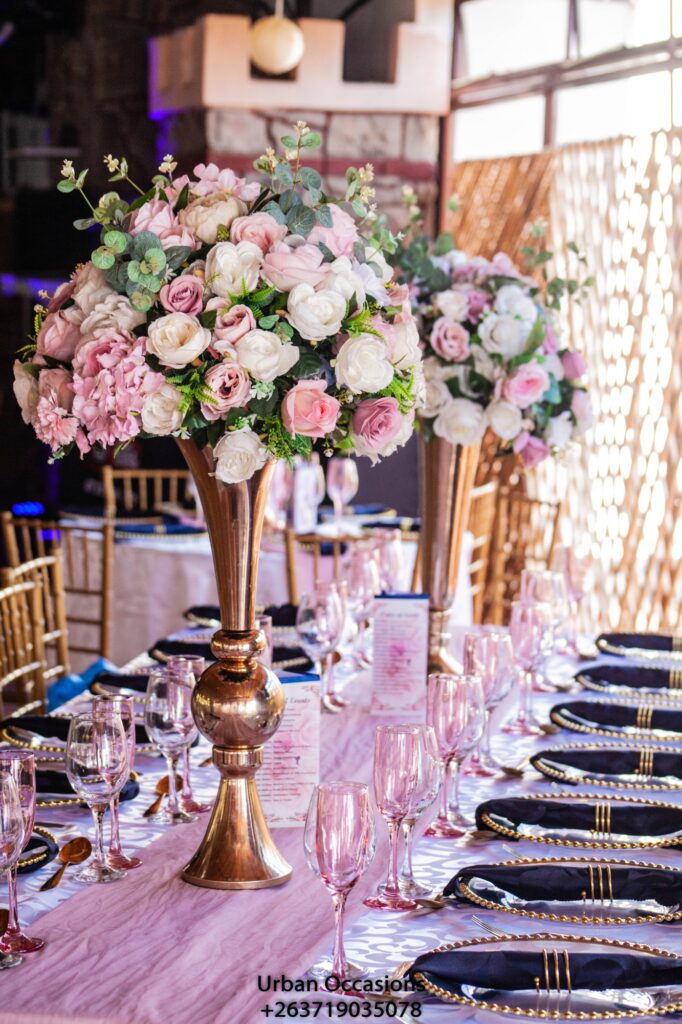
Disadvantages of Holding a roora ceremony and wedding on one day
-
- More money is required up front – holding the two celebrations on different days means that the money required for both can be spread over a longer period of time.
-
- Whereas if both are to be held on one day, it means the money required for both celebrations will be needed at the same time. This is because the in laws will require all their money to be in place whilst the service providers will all need their payments to be made in full on or before the chosen date.
-
- This could prove to be financially strenuous to the couple.
-
- More money is required up front – holding the two celebrations on different days means that the money required for both can be spread over a longer period of time.
-
- Planning the two events is not easy – planning one event is strenuous, what more planning two events? Planning a lobo- wedding is definitely not an easy fit and will require more events planning expertise from the couple. It can be even more overwhelming if the couple decides to do this without the help of a trained wedding planner.
-
- To make life easier for couples, I often suggest enlisting the services of a trained wedding planner when planning their loboweddings
-
- Planning the two events is not easy – planning one event is strenuous, what more planning two events? Planning a lobo- wedding is definitely not an easy fit and will require more events planning expertise from the couple. It can be even more overwhelming if the couple decides to do this without the help of a trained wedding planner.
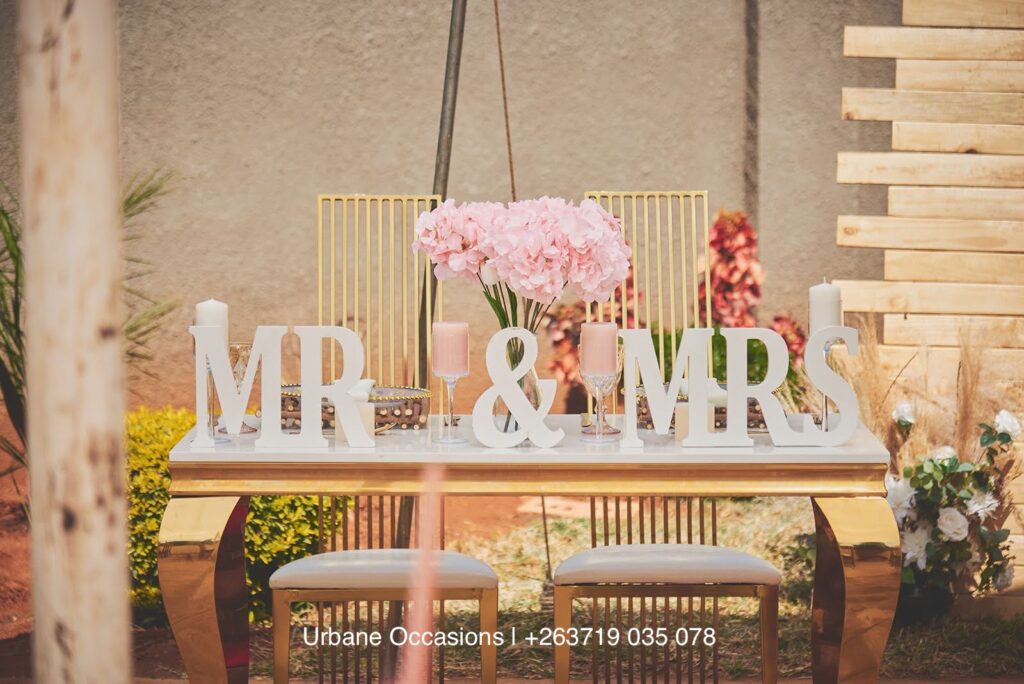
How to Plan a Combined Roora and Wedding Day
Seek approval from your parents
Before you make any concrete plans, you need to get your parents approval. Without your parents co-signing your idea, your plans might be futile.
Traditionally, after the bride price has been paid, the groom and his representatives ask the the brides parents for their permission to hold a wedding. The brides parents can then choose to approve of the request or deny it depending on their own family traditions as well as the amount of money that the groom would have come with.
Additionally, the grooms parents do not attend the roora celebrations. Their representatives in the form of uncles and aunts (Ana tete) are the ones who attend the lobola celebrations.
Hence, a couple cannot combine the roora and wedding day celebrations without their parents consent.
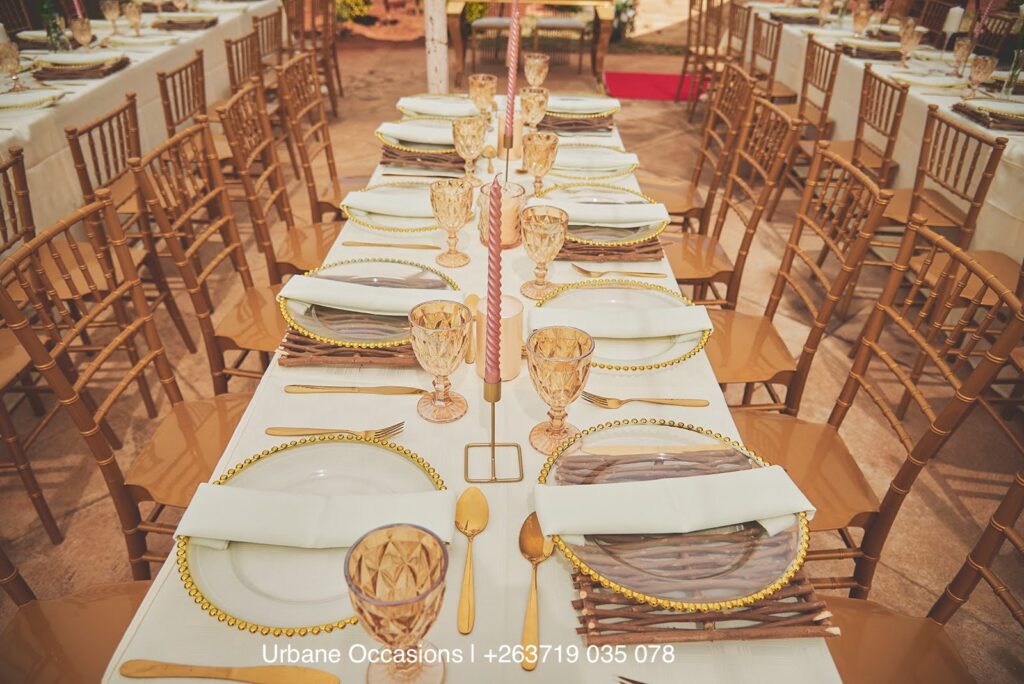
Meet with your marriage officer
After obtaining the parental blessing, the next step is to obtain the marriage certificate.
To obtain a marriage certificate, you need a letter from their marriage officer. Usually, the marriage officer is the brides’ pastor or minister. However, some couples opt to hire a professional marriage officer instead.
The letter from the marriage office contains details of the couple including their full names and residential addresses as well as the details of the marriage officer.
Couples can also arrange premarital counseling sessions with their marriage officer in preparation for the lobo-wedding.
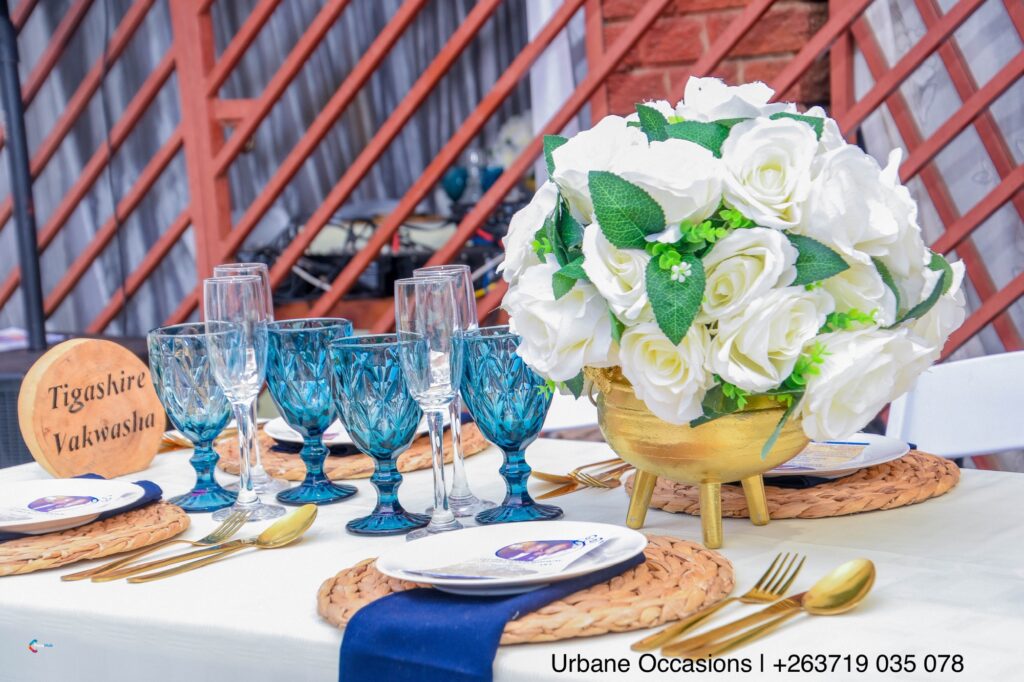
Apply for the marriage certificate
Zimbabwean marriage certificates are obtained from the magistrate’s courts. The couple pays a small fee (USD5 at the time of writing this article). They also submit passport photos, copies of their identity documents as well as the letter from the marriage officer. The couple will be given a form to fill out. This form captures all the important details about the couple and wedding such as the couples names , identification details, wedding date etc.
Points to take note of:
-
- Both the bride & groom have to be present when applying for the marriage certificate
-
- The couple has to be dressed formally when applying for and collecting the marriage certificate. Brides, please try to be as modest as possible and wear clothes that cover their chests and shoulders.
-
- To avoid waiting in line for a long time due to the long queues, try to be as early as possible
-
- Dress formally for your passport photos
After your application is accepted, you will be given a collection date and time. Try to ensure that both of you are present and try to be as early as possible to avoid missing your allocated time slot.
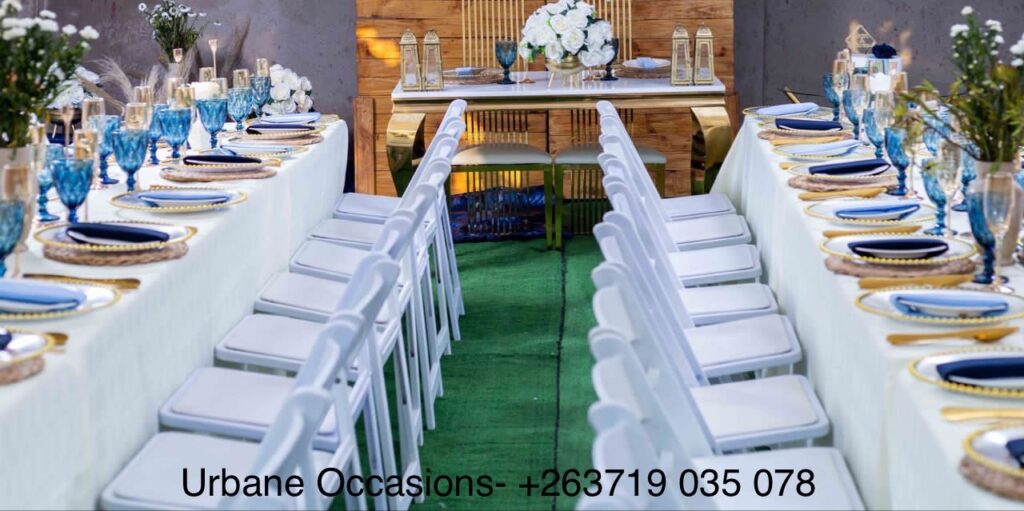
Start Planning Your Lobo – Wedding
Once you have done the above mentioned processes, you can now start planning your combined lobola wedding day!
You will need to decide on the venue. Most will host their combined lobola and wedding celebrations at the brides’ residence but some will decide to book a separate venue. The ultimate decision about the location all boils down to preference.
The brides parents can ensure that the groom is given a full list of all the lobola requirements in advance to avoid spending an unnecessarily long time negotiating and deliberating over the list.
The groom should also strive to come well prepared with all the requirements.
The roora decor should be set up In the morning during the lobola negotiations. All the service providers including the roora catering team, DJ & PA system team, Master of Ceremony (MC) etc, should ensure that all their preparations and setups are completed on time to avoid delaying the program.
To ensure that there is ample time for the wedding ceremony and celebrations, you should aim to finish all lobola/roora proceedings by 12pm.
Invited guests can be asked to arrive by 1pm and by 2pm, the wedding proceedings should be in full swing.
A combined lobola and wedding ceremony is a great way to combine cultural and religious wedding celebrations. If you need help planning your lobo-wedding, you can click here to view our wedding planning packages.
